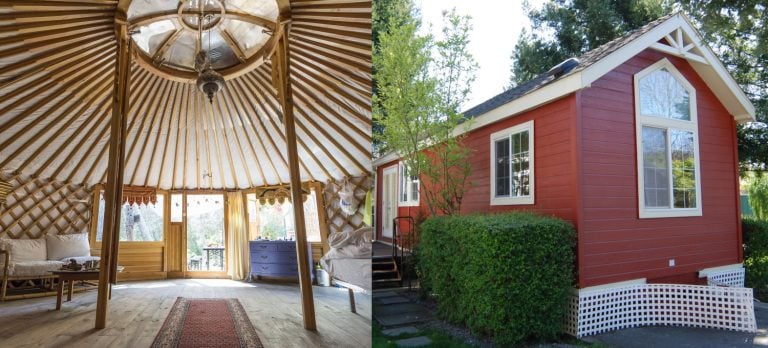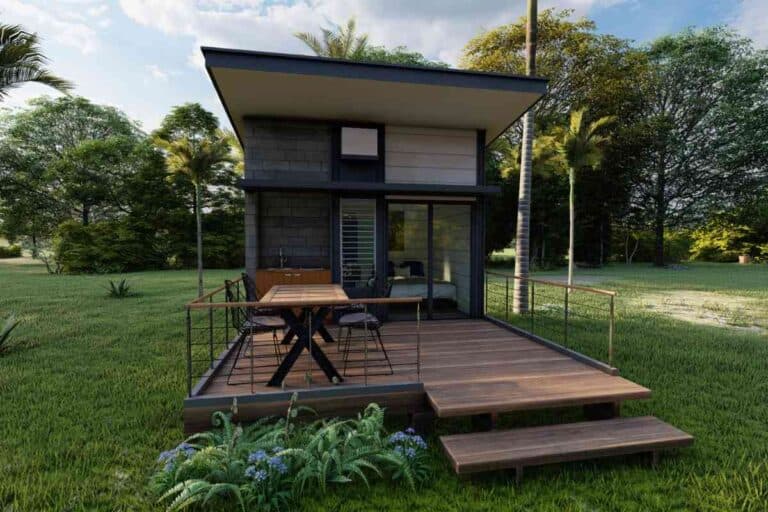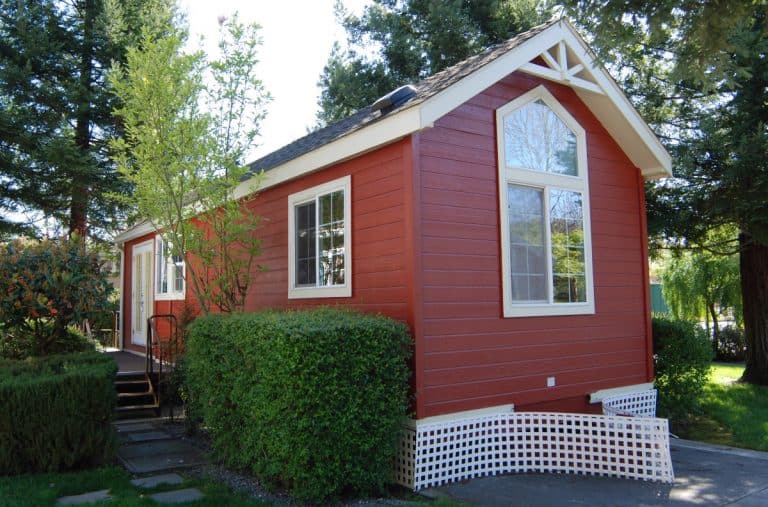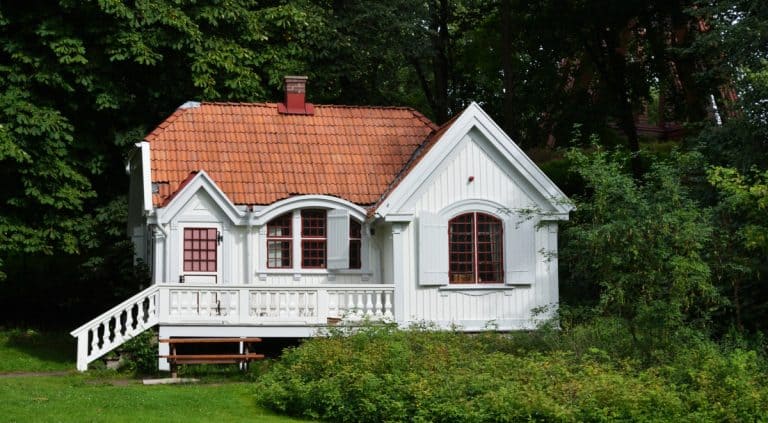Can You Put a Tiny House in A Mobile Home Park?
One of my very good friends is an elderly man who lives in a mobile home park and loves it. One of the things that make his community special is the fact that it is small, and everybody knows everyone. There are very few problems with security and vandalism because they know who does what in the community. To top it off, he pays less in rent than if he lived in an apartment complex.
However, his mobile home is a very old thing. It definitely shows its age, and my friend wants to replace it. He has been looking into tiny houses because he knows that it could not only cost less to buy and maintain but also provide a better living experience. Unfortunately, when he mentioned this concept to the park management, they told him that he would not be able to put a tiny house on his lot. The reason? Because “it wasn’t what the community was used to.”
So, I decided to look into this myself and see if I could find out more information about putting a tiny house in a mobile home park. I found out some interesting things about tiny houses and mobile home parks:
Putting a tiny house in a mobile home park can be difficult. You’ll need to abide by all the building codes for a mobile home and get permission from the park manager. If you find that none of your preferred parks allow you to put a tiny house, consider looking for communities intended for tiny houses.
After contacting the aforementioned management office, I learned that specifically, he would not be able to place a house on his lot at all for multiple reasons. First off is the fact that where they live now is specifically zoned for mobile homes; therefore, only mobile homes are allowed on the lots.
In this post, I will go over what I found out about putting a tiny house in a mobile home park. I hope that it may help you and others make educated decisions about what to do with your tiny house.
Can You Put a Tiny Home in a Trailer Park?
You can put a tiny house in some mobile home park, but not all parks will accept a tiny house. Challenges include getting the mobile home approved by the park’s owners and meeting building codes and local zoning regulations.
Most parks will require the tiny home to be registered as a mobile home. This is because the parks are zoned and developed for mobile homes. This means your tiny home will need to meet mobile home safety codes, as well as connect to standard utilities for a mobile home park. These include water, sewer, and electric hookups.
Many mobile home parks require that a certified manufacturer constructed your tiny house. This is to ensure that the structure has been built to meet mobile home standards.
Often, non-standard homes will have to go through an approval process to decide whether they are allowed in the park at all. A tiny house may be considered incompatible with the park’s rules regarding shape and size. One issue is that tiny houses are usually around 400 square feet, but some can be just 150 square feet which is usually too small to be considered a habitable structure.
Another issue is that if the park has rules about aesthetic designs, your tiny house may violate these rules. While mobile homes have very similar looks (from the outside, at least), most tiny houses have very unique designs. They may be seen as out of place or too non-traditional for some mobile home park residents. This can detract from the neighborhood and prevent your application from being approved by the park board or community.
Even if your tiny home is accepted, you will stand out a lot compared to the other mobile homes. The more unique your structure looks, the harder it will be to blend in with the other homes – which may or may not be a bad thing depending on your circumstances.
Is a Tiny House on Wheels Considered a Mobile Home?
Tiny houses are generally not considered mobile homes from a legal perspective. This is because most tiny homes are too small to be categorized as mobile homes. According to the federal Department of Housing and Urban Development (HUD) code, structures under 320 square feet are explicitly excluded from the regulations:
Manufactured home means a structure, transportable in one or more sections, which in the traveling mode is 8 body feet or more in width or 40 body feet or more in length or which when erected on-site is 320 or more square feet, and which is built on a permanent chassis and designed to be used as a dwelling with or without a permanent foundation when connected to the required utilities and includes the plumbing, heating, air-conditioning, and electrical systems contained in the structure.
Manufactured Home Construction and Safety Standards
This is great for many tiny house owners, as they have more freedom to build or modify their homes as desired. However, this also excludes them from being placed in most mobile home parks, which are usually legally required to allow only mobile homes.
However, if the tiny house is over 320 square feet and/or more than 8 body-feet wide or 40 body-feet long, it can be considered a mobile home. Provided all the other requirements of HUD are met.
How to Get Approval for a Tiny House in a Mobile Home Park?
Getting approval to put a tiny house in a mobile home park can be difficult. In order to get permission, you’ll want to build your tiny house according to the HUD building code for a mobile home, which is very detailed and specific. Hiring a manufacturer with experience in building to code can make this a lot easier for you.
Only after the tiny house has been built to HUD code will the park management be able to accept it if all other requirements are met. It’s a good idea to get pre-approved by the park manager before building anything. In addition, if the park or local authorities require it, you may need to get your tiny house certified as a manufactured home by HUD or a similar authority.
I also recommend you make the process as easy as possible for the park manager by preparing the necessary documents so they can be easily inspected, approved, and registered. The more legwork you do for the park manager, the more likely it is that your tiny house will be accepted.
Ultimately, the best way to get approval is to have support from the park management and other residents in advance of your project. Tiny houses provide an opportunity for social sustainability that can lead to positive change in individuals and in communities overall. Park managers may take advantage of this as long as they are convinced that allowing tiny homes is legal and will not bring trouble to the park.
An Alternative to Mobile Home Parks
Perhaps you can’t find a park that allows tiny houses or don’t want to live in one if it requires you to abide by regulations that will limit your creative freedom.
Luckily, there are several other options – such as placing it on your own land. But if you prefer the social aspects of mobile home parks, consider looking into tiny house communities. Many tiny home dwellers prefer to live in such intentional communities where there is a shared vision.
Most tiny house communities are similar to mobile home parks in the sense that they offer benefits such as utilities, common areas, and like-minded neighbors. These communities are usually run by non-profit organizations dedicated to promoting sustainable living. You’ll need to pay a monthly rental fee for access to the land and facilities, as well as regular charges for utilities, internet, and other common expenses. However, some communities are more rustic than others.
New tiny house communities are being created all over the country. It is possible to choose where you want to live and find people who share similar values about living simply and frugally without having to convince your neighbors first or apply for exceptions. You may have more freedom when building your house because there are fewer (or at least other) regulations than in a typical mobile home park zoned specifically for mobile homes.
In Summary
It’s sometimes hard to find a place to live, especially if you’re looking for something affordable. Mobile home parks are an option, but they have rules about what you can do with your property.
There are some mobile home parks that allow tiny homes on their properties. If you want to live in a park, you’ll need to find out how to get approval for a tiny house in your preferred park. But also consider looking for alternatives, so you can build the home you want (and where to you want it) on your terms.
Be sure to check out other articles on this site about building and living in a tiny house, including What Size Tiny House Do I Need?, How to Build Your Tiny House, Tiny Houses: Can You Live in One Permanently?, and Yurt Vs. Tiny House: Which Is Better?.






